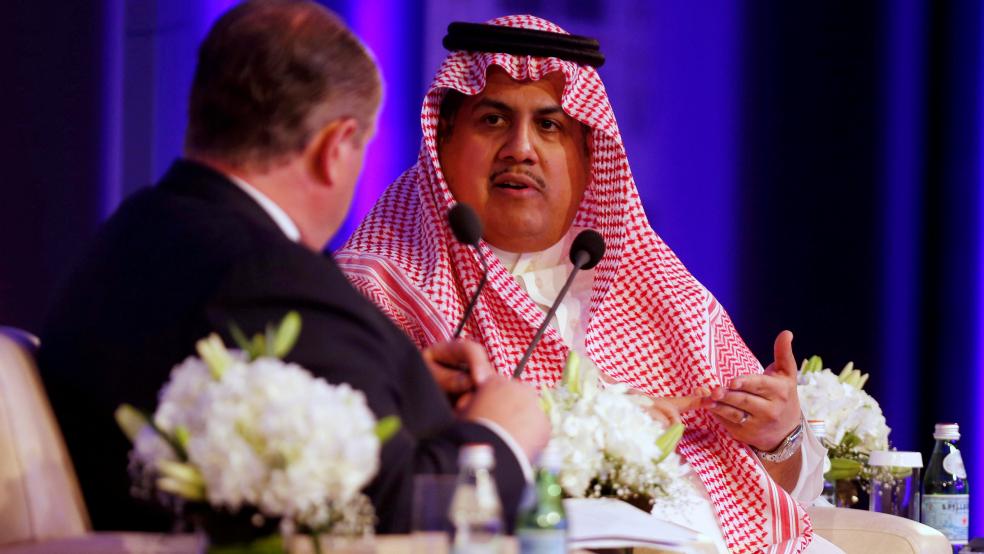Saudi Arabia has been a hot bed of bad news recently. First, there was their horrifying war in Yemen, then their empty threat to start selling off U.S. debt. Most recently, the 30-year-old Deputy Crown Prince Mohammad bin Salman, who heads the Saudi Council for Economic and Development Affairs (and also serves as defense minister) laid out a new plan, dubbed "Vision 2030," to transition the country away from selling oil. While it may sound positive — vision! less oil! — the plan is actually pretty ominous.
As detailed in an interview with Al-Arabiya, the core of the plan is to spin up a sovereign wealth fund with Saudi assets, plus a public sale of a small portion of the Saudi national oil company Aramco. More funds would be added from oil revenue over time, so that eventually Saudi Arabia would end up owning something like "10 percent of global investment capacity." In another interview with Bloomberg Businessweek, Prince Salman made the strategy even clearer: "Make investments the source of Saudi government revenue, not oil."
Related: 8 Weapon Systems the U.S. Is Selling to Saudi Arabia
So instead of relying on the sale of natural resources for money (currently about 80 percent of its national budget), Saudi Arabia will collect capital rents instead, and attempt to build a productive non-oil sector. One can easily understand the motivation here — oil won't last forever. But there's every chance that the effort will fail, and leave another chaotic mess in the Middle East.
To be fair, the sovereign wealth fund isn't everything Mohammad bin Salman wants to do. He also plans to introduce a green card, make it easier for tourists to visit, trim subsidies (especially for the rich), start collecting some modest taxes, and start producing gobs of military hardware. These all make at least some sense, but they're the least likely part of the plan to work.
Transitioning from huge raw material exporting to a modern industrial economy is so unusual that development economists often refer to a "resource curse." Youth unemployment in Saudi Arabia is 30 percent, and two-thirds of Saudi workers are employed by the state. In the private sector, 80 percent of employees are foreigners. And though the birth rate has fallen fast in recent years, there is still a massive new generation coming through the demographic pipeline. (Oh, and the country is severely short of water.)
What's more, the Saudi state itself is an anachronistic throwback ill-suited to the sort of enormous sectoral rebalancing being proposed here. That requires competence and professionalism, but the absolute Saudi monarchy is a hugely complex network of favor-trading and familial ties, with politics defined by jostling among the tens of thousands of members of the House of Saud. Popular stability is outright purchased by generous subsidies. Half the population is treated like dirt. The monarchy almost certainly would not exist without its oil money — and even the supposed sensible reformer Mohammad bin Salman has already started one stone idiotic war of aggression.
Related: The Saudi Royal Family's Brittle Grip on Power Is Cracking
So that leaves the investment gambit. This makes a lot more sense — indeed, it's largely just a scaled-up version of the program Norway has already tried with its sovereign wealth fund, which owned roughly 1.3 percent of all world stocks as of 2014.
But the Saudi version is potentially so much larger that geopolitics is likely to interfere. Corporations are the creation of national laws, and some polities are likely to resent a foreign power owning a 10th of all the stocks in the land. Xenophobic nationalists the world around will be angry at one out of every ten dollars of corporate dividends going to support a backwards, repressive monarchy halfway around the world. Laws forbidding or limiting foreign investment are likely to spring up at least somewhere.
However, climate policy is an even bigger problem. The Paris climate accords were recently signed, and if warming is to be kept below the internationally-agreed guardrail of 2 degrees Celsius, extremely aggressive additional policy is needed on top of what's currently happening. This means making the Saudi oil as worthless as possible, as fast as possible, starting now. Particularly if oil prices stay low, the Saudis simply might not have enough time to buy up the world's stocks before their core asset is totally devalued.
And without oil, the Saudi state has little else holding it together. The result could be yet another chaotic failed state in the Middle East — and this time in the home of Islam's holiest sites.
This article originally appeared on The Week. Read more from The Week.
Why Ted Cruz failed to carry the #NeverTrump banner
Can the GOP escape its destiny of demographic disaster?
U.S. businesses are merging like crazy. And Uncle Sam is responding all wrong.




